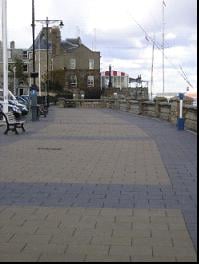Street Cleansing
Routine Cleansing
Code of Practice on Litter and Refuse
The Isle of Wight Council is responsible for ensuring that public highway and Council owned land are kept free of litter in accordance with the Governments national Code of Practice on Litter and Refuse. You can view the Code on DEFRAs website. The code states that what is important is maintaining the cleanliness of an area, rather than how often it is cleansed.
Cleansing Frequency
All adopted highway on the Island has been zoned based on factors such as housing density, traffic use, public usage and the presence of retail premises. A cleansing frequency is then applied to each zone. For example, a residential street will be cleansed less frequently than a main shopping street. Cleansing frequencies range from twice a day in main town centre areas to twice a year and, in some areas, are increased in the summer period.

Cleansing Standards
After a “full cleanse” we expect that all litter and detritus (mud and grit) is removed from the pavement and the road. Where a pavement is bordered by a hedge, this includes removing litter from the base of the hedge and up to 2m high on the face of a hedge. Detritus and litter will be removed from gutters and gully grates, but the gullies themselves are cleansed under a separate service (Gully Cleaning).
Between full cleanses, there may be a “litter pick” carried out, which is removal of litter only. Dog fouling is treated as litter and will be removed as part of a litter pick. All litter above the size of 4 square centimetres (about the size of a match box) will be removed.
Engineering Services have 8 Area Superintendents (Highway Superintendents) who randomly inspect a proportion of the streets after cleansing to ensure that the required standards have been met by our contractor. In addition to this, the Area Superintendents are continuously inspecting streets between cleanses and should the standard of cleanliness fall below acceptable levels they will arrange for additional cleansing or litter picking to be carried out.
Between full cleanses, there may be a “litter pick” carried out, which is removal of litter only. Dog fouling is treated as litter and will be removed as part of a litter pick. All litter above the size of 4 square centimetres (about the size of a match box) will be removed.
Engineering Services have 8 Area Superintendents (Highway Superintendents) who randomly inspect a proportion of the streets after cleansing to ensure that the required standards have been met by our contractor. In addition to this, the Area Superintendents are continuously inspecting streets between cleanses and should the standard of cleanliness fall below acceptable levels they will arrange for additional cleansing or litter picking to be carried out.
Page last updated on: 23/02/2006





